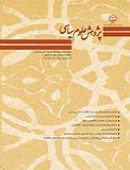پارادوكس اورولي
محورهای موضوعی : پژوهش سیاست نظری
1 - استادیار دانشگاه آزاد اسلامی واحد تهران جنوب
کلید واژه: اورول سوژه سياسي سوژه متافيزيكي پارادوكس نظام بدون سلطه,
چکیده مقاله :
جورج اورول، رمان نويس انگليسي، رمان معروف «1984» را نوشت تا يوتوپياهاي عصر خود را نقد نمايد. وي كه در صدد بيان و هشدار در باب آينده احتمالي توتاليتري همه جا حاضر است، در رمان خود انساني را به تصوير ميكشد كه ساختارهاي قدرت به شدت متصلب وي را تبديل به سوژهاي سياسي، يعني تابع ساخته است. سوژهاي كه به نهايت خود رسيده است. بنابراين مهم نوع نگاه اورول به انسان و تبديل كردن آن به سوژه است. اين تأكيد بيش از حد اورول بر سوژگي، انسان را متافيزيكي كرده و نظام يوتوپيايي ديگري را پيش روي وي قرار داده است. نظامي كه اورول در ابتدا در پي نقد آن بوده اما خود گرفتار آن ميشود. در واقع پارادوكس اورولي در همين امر نهفته است، چرا كه وي در عين نقد يوتوپيا، نظام يوتوپيايي بدون سلطه را به سوژه متافيزيكي خود پيشنهاد ميدهد. پارادوكسي كه با نوع نگاه اورول به انسان به مثابه سوژه سياسي شروع شد.
George Orwell, the English novelist, wrote his famous novel "1984" to criticize the utopias of his era. In his novel, Orwell, always seeking to warn about the possible outcomes of totalitarianism, portrays a man who is subjugated by the rigid power structures and has become a political subject, a subject pushed to his limits. Therefore, the important point here is Orwell's view of human being and its transformation to a subject. Orwell's overemphasis on subjugation gives a metaphysical aspect to human being and at the same time offers him another utopian system. The very system that Orwell previously intended to criticize, now entraps him. In fact, this is exactly where Orwell's paradox lies; since while criticizing utopia, he proposes non-dominance utopia to his metaphysical subject. This paradox is due to Orwell's view to human being as a political subject.

